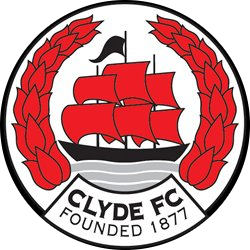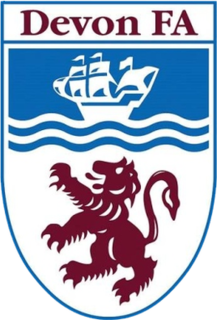
Clyde Football Club is a Scottish semi-professional football club who play in Scottish League One. Formed in 1877 at the River Clyde in Glasgow, the club host their home matches at New Douglas Park, having played at Broadwood Stadium from 1994 until 2022. Their biggest accomplishments were winning the Scottish Cup on three occasions: 1939, 1955 and 1958; they reached the final a further three times, all during a long period based at Shawfield. They have not played in the top division of Scottish football since 1975.
The Scottish football league system is a series of generally connected leagues for Scottish football clubs.
Association football is organised on a separate basis in each of the four constituent countries that make up the United Kingdom (UK), with each having a national football association responsible for the overall management of football within their respective country. There is no United Kingdom national football team. Football has been the most popular sport in the UK since the 1860s. Rugby union, rugby league and cricket are other popular sports.
The Excelsior Stadium, currently known as the Penny Cars Stadium for sponsorship reasons, is a football stadium in Airdrie, North Lanarkshire, Scotland. It is the home ground of Airdrieonians F.C. of the Scottish Professional Football League (SPFL). Since the 2021–22 season it has also been used by Celtic F.C. for the home matches of their women's team in the Scottish Women's Premier League (SWPL) and B team in the Scottish Lowland Football League, as well as by Glasgow University F.C. of the West of Scotland Football League. It is an all-seater stadium with a capacity of 10,101, and has a 3G artificial surface.
The Inter City Football League was formed in 1899 in Scotland as one of several supplementary football leagues that were created in order to increase the number of fixtures for Scottish Football League clubs.
The Glasgow Football League was formed in 1896 in Scotland as one of several supplementary football leagues that were created in order to increase the number of fixtures for Scottish Football League clubs. In 1899 a number of clubs who played in the Edinburgh / East of Scotland Football League joined and the league was renamed the Inter City Football League. The Glasgow Football League was briefly reformed in its own right in 1904.
The Edinburgh Football League was formed in 1894 in Scotland as one of several supplementary football leagues that were created in order to increase the number of fixtures for Scottish Football League clubs. It changed its name to the East of Scotland Football League in 1896 when Dundee joined.
The Inter City Midweek Football League was one of several Scottish supplementary football leagues run in the 1912–13 season.

The Devon County Football Association, also simply known as the Devon FA, is the governing body of football in the county of Devon. The Devon FA was founded in 1888 in Plymouth.
The Scottish League XI was a representative side of the Scottish Football League. The team regularly played against the (English) Football League and other national league select teams between 1892 and 1980. For a long period the annual fixture between the English and Scottish leagues was only second in importance to the matches between the two national teams. The fixture declined in importance after regular European club competition was instituted in the 1950s; matches in the 1960s and 1970s were played irregularly and poorly attended. A match involving a Scottish League XI was last played in 1990, to mark the centenary of the League.
The 1935–36 FA Cup was the 61st season of the world's oldest football cup competition, the Football Association Challenge Cup, commonly known as the FA Cup. Arsenal won the competition for the second time, beating Sheffield United 1–0 in the final at Wembley, through a late goal from Ted Drake.
The 1932–33 FA Cup was the 58th season of the world's oldest football cup competition, the Football Association Challenge Cup, commonly known as the FA Cup. Everton won the competition for the second time, beating Manchester City 3–0 in the final at Wembley.
The 1924–25 FA Cup was the 50th season of the world's oldest football cup competition, the Football Association Challenge Cup, commonly known as the FA Cup. Sheffield United won the competition for the fourth time, beating Cardiff City 1–0 in the final at Wembley.
The 2009–10 Scottish Cup was the 125th season of Scotland's most prestigious football knockout competition. The competition was sponsored by the Scottish Government and for sponsorship reasons was known as the Active Nation Scottish Cup.
The 2019–20 SFA South Region Challenge Cup was the 13th edition of the annual cup competition for senior non-league clubs in the central and southern regions of Scotland. This season saw the competition increase to 70 teams despite the demise of Selkirk and withdrawal of Eyemouth United, thanks to the relegation of Berwick Rangers to the Lowland League plus the addition of Glenrothes and Kinnoull to the East of Scotland Football League.

Founded in 1883, the Glasgow Football Association, based in the city of Glasgow, Scotland and affiliated to the national Scottish Football Association, is one of the oldest such bodies in football. In the modern game its influence is limited, the remit being "to represent the interests of the senior football clubs in Glasgow". Those senior clubs competing across the divisions in the Scottish Professional Football League include the two largest and most successful in the country by some distance, Celtic and Rangers, as well as Partick Thistle, Queen's Park and Clyde ; the three smaller clubs exist in the shadow of their dominant neighbours. A sixth team, Third Lanark, had a strong record until their sudden collapse in the mid 1960s.
The town of Clydebank in West Dunbartonshire, Scotland has been home to, and given its name to, several football teams since 1888. Five of these teams have shared a name, Clydebank F.C., but all are distinct entities.
Clydebank Football Club was a Scottish football club based in the town of Clydebank, West Dunbartonshire. The fourth entity to carry the name, Clydebank were formed in 1965 following the relocation of East Stirlingshire Clydebank F.C., a club formed by a contentious merger of Clydebank Juniors and East Stirlingshire in 1964 to bring a with the intention of creating a senior club for the town; this arrangement lasted only one year before East Stirlingshire continued alone as before and a new Clydebank team was formed. Playing their home games at Kilbowie Park, they were elected to the Scottish Football League in 1966. Clydebank had two short spells in the Scottish Premier Division, and reached the semi-final of the Scottish Cup in 1990, whilst a First Division club.


